True Believers in the Zeitgeist of '85
Sincerely leaving the '70s behind as Austin gets rediscovered
My first national magazine assignment in late ‘85 was on the Austin music scene for Spin, and I cranked out 4,000 words in one 15-hour writing session. The editor earned his money. My intro was an homage to a paragraph of the “Tribal Rites of the New Saturday Night,” (“Lorraine loved Gus. Gus loved Donna. And Donna loved Vincent…”) a New York magazine article which was the basis of Saturday Night Fever. I was staying with relatives on Long Island the summer of ’76, because I had no money, but plenty of delusions about being a New York City writer. When that Nik Cohn article came in the mail, it was my best afternoon on L.I., but it also showed me how far I had to go. All the way back to Honolulu.
Years later, Cohn admitted he made up the characters and the plot of his Brooklyn disco drama, which is, coincidentally, also what I did. Nobody had to know that the female protagonists were a composite of residents of the House of Many Women at San Gabriel and 28th. Unlike Cohn I did enter the clubs I wrote about, and the observations are true. I just didn’t need Debbie Pastor on my ass.
'Veronica loves True Believers, Wild Seeds and Doctors' Mob; likes Dharma Bums and Glass Eye; hates Zeitgeist. Lesa loves Zeitgeist and Dharma Bums; likes Wild Seeds and Texas Instruments, thinks True Believers are so-so. Patrice loves True Believers, Zeitgeist and Glass Eye and likes everyone else except Poison 13.'
“The New Sincerity” (Spin Feb. 1986)
All of a sudden there were all these bands that listened to the same records, yet sounded almost nothing alike.
In 1985, Austin was in the throes of a real-estate bust (cheap rent!), but the music scene, centered on the Beach Cabaret, Continental Club and Liberty Lunch was booming. In August ‘85, MTV devoted an entire Cutting Edge episode to an Austin that was more than Willie Nelson and Stevie Ray Vaughan. "This Ain't the Summer of Love," the Dharma Bums sang in the midst of sweaty, delirious faces that said otherwise. This “New Sincerity” scene, which wore insult as insignia, had a great sense of humor, as when Glass Eye rang in 1987 at the Continental by covering the, by then insufferable “Sweet Jane” with each player in a different key.
There were so many defining records of that era: Mud, Lies and Shame by Wild Seeds, Headache Machine by Doctors’ Mob, Huge from Glass Eye, the Scratch Acid EP, Sun Tunnels by the Texas Instruments, Poison 13 on Wrestler. But the Lost Generation of Jangly Guitars was officially ushered in with the 1985 release of Translate Slowly. That Zeitgeist record was proudly Texan (covers of Willie's "Blue Eyes Crying in the Rain" and the instrumental "Hill Country Theme"), yet exotically powerful and artfully accessible.
Talk about chemistry; the interplay between John Croslin's deadpan growl and Kim Longacre's angelic harmonies sounded like Lou Reed joined the Mamas and the Papas. This was a dynamic band of four individuals, including bassist Cindy Toth and drummer Garrett Williams, who melted together in song.
If the major labels drafted unsigned acts like their pro sports counterparts do players, Zeitgeist would've been a lottery pick. The band signed with Capitol, home of the Beatles. They were on their way. Everybody knew it.
They had the songs- "Freight Train Rain," “Things Don’t Change,” "Sound and the Fury,” "Araby," "Secretariat" and so on- that charmed college radio, but Zeitgeist was even better live. Their shows at Liberty Lunch were events, with the front row diehards led by Rob Thomas, who would go on to create Veronica Mars. After the show there was always a big, jubilant party ‘til the kegs ran out and the speed wore off. Those were nights you forgot the next weekend, but remember years later.
In the summer of '87 the band lost nearly all its momentum when a Minnesota choral group called Zeitgeist (which means "spirit of the times") demanded a name change. To avoid a lawsuit, Capitol wouldn't put out the next record, the Don Dixon-produced Saturday, until Austin's Zeitgeist found a new handle. I suggested Whitegeist, but they went with the Reivers, after the William Faulkner novel. Zeitgeist was such a perfect name.
The band, which also released End of the Day on Capitol in 1989 and its 1991 swan song Pop Beloved on DB, reunited in 2008 for its first gig in 17 years at the Parish. The pair of sold-out shows came out of nowhere, with no reissue to hype or anniversary to mark. Fans flew in from all over the country for a show like the old days, a fun gig in a room full of friends. And no, the group, which always shirked the obvious, did not open with "It's About Time."
1985 lasted only two years. A punishing bodyshot came in Sept. ‘86, when the drinking age rose from 19 to 21, hurting the clubs at the register and the bands in the amount of energy they got back. The Beach closed the next day, and became the Crown & Anchor Pub. But the uppercut knockout was in August '87, when the Mark/J’Net Continental Club closed. That was also the year the True Believers broke up, which to the Austin music scene was like an American Bald Eagle committing suicide.
TRUE BELIEVERS
During my four years writing for the Austin Chronicle I was ringside for Joe Ely, Lou Ann Barton, the LeRoi Brothers, the Fabulous Thunderbirds, the Tycoons (Austin's greatest forgotten band), Stevie Ray Vaughan, Charlie Sexton, Omar and the Howlers, Evan Johns and the H-Bombs and on and on. These bands could all raise the roof at a bomb shelter, but each was expendable in our roots-rock-heavy scene. If, say, Joe Ely moved to Montana, Bill Carter could throw on some turquoise gabardine, and hire Bobby Keys, and though it still wouldn't be Joe Ely, it wouldn't be so far off as to make you think about taking a Greyhound to Butte.
There was no one, however, who could replace the True Believers, the roots band who worshipped T-Rex and the Stooges, creating glamericana. They were the only “New Sincerity” band that dressed like rock stars.
If Slacker was more realistic there would’ve been a scene where two people walk down the street and argue True Believers vs Zeitgeist as Austin’s best band, with Teresa (“Madonna Pap Smear”) Taylor, popping out of the alley to say that the only correct answer was Butthole Surfers.
Though both bands were influenced by the Velvet Underground, Zeitgeist was harmony-driven, while the Troobs of Alejando and Javier Escovedo, plus Jon Dee Graham, just wanted to fry your nosehairs. On a great night you’d forget your name.
“Who else can make it feel like 5 a.m. in a town that shuts down at 2?,” I wrote in 1985. “True Believers can almost make you shoot up the rent money while some skinny skirt trash in troll doll hair leans over the side of the bed, throwing up loud enough to be almost heard over a cranked-up Fun House.”
But a 1986 self-titled debut album produced for under $10,000 by Jim Dickinson (Big Star, Replacements) didn’t exactly capture the explosion, focusing too much on vocals and lyrics we ignored live. (I had thought their first single was about a lazy party guest ducking clean-up: “Lorraine Won’t Help You When It’s Over.”)
EMI flipped over True Believers, and having seen them live at the Lone Star Café in NYC (photo above), bought out their contract from Rounder. Our boys were on their way, with a big budget earmarked for the follow-up, produced by Jeff Glixman whose “Keep Your Hands to Yourself” by Georgia Satellites was a huge hit.
Everybody was thinking “She’s Got” would be the lead single off TBII. But while finishing touches were being applied, EMI was folded into Manhattan Records, on its way to becoming absorbed by Capitol. The band wasn’t lost in the shuffle- they were hosed down.
True Believers died soon after Benedict Escovedo joined MCA recording artists Will and the Kill, who had a tour bus. After five years on the Troobs’ hard road, Javier was ready for his own bunk. That “career-making” Troobs album didn’t come out until 1994, seven years after the breakup, when Rykodisc combined both the band’s albums into Hard Road.
After all the media attention on Austin and the emergence of Timbuk3, bands started moving to town in droves. South by Southwest launched in ‘87 and everyone was looking for a record deal. The amp was blown on a scene that was hyped up to 11. By the early ‘90s, even the Butthole Surfers weren’t cool anymore.
Austin was tagged the next Athens, GA. But we never produced an R.E.M. or a B-52s, just a whole lotta Pylons and Love Tractors and Guadalcanal Diaries.
In 1985, that was more than enough.
More to read and watch:
“The New Sincerity” from Feb. ‘86 Spin
MTV’s “Cutting Edge” hour devoted to Austin.
Cover photo by Pat Blashill.



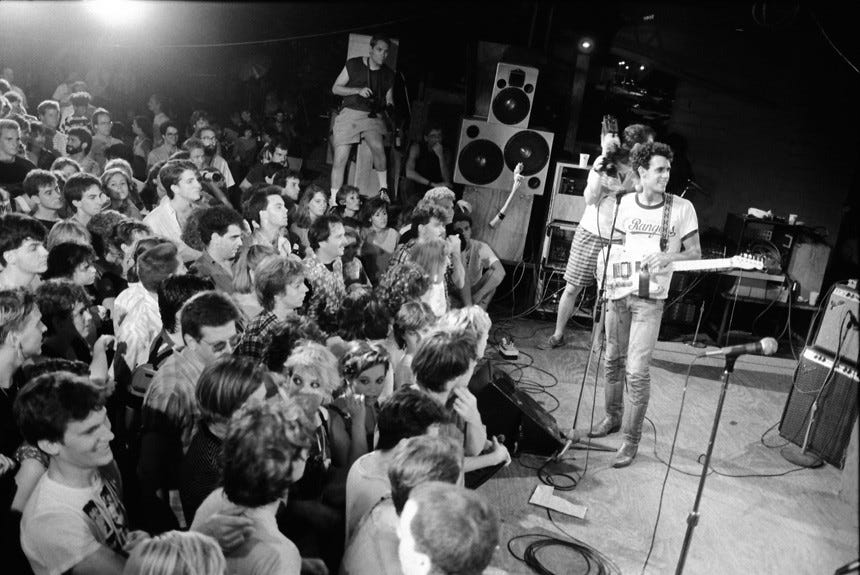
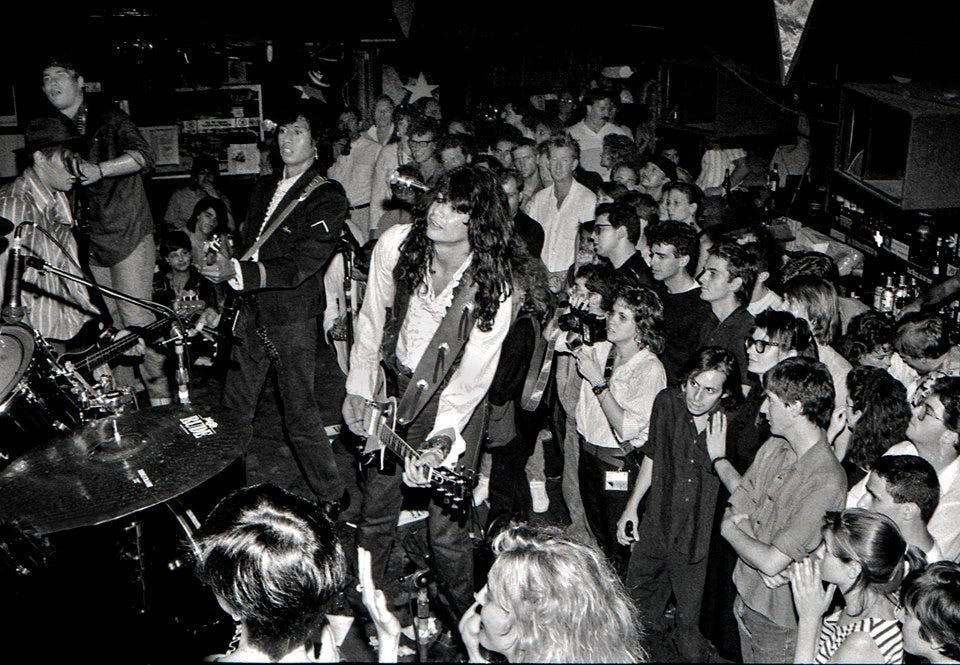
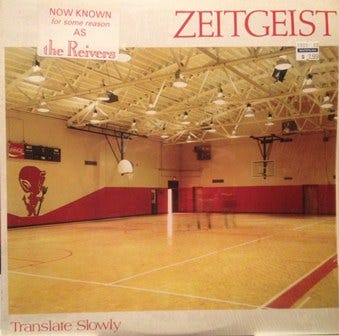
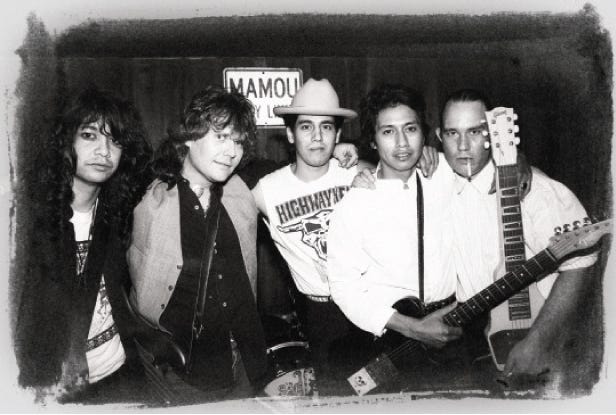
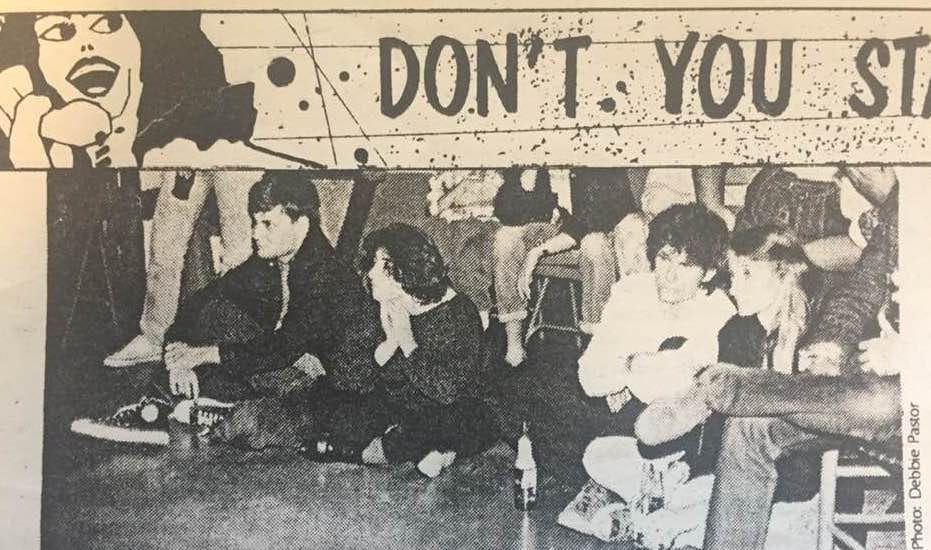
I wish more groups that played at The Beach in the early 80's made it big, I think Natalie Merchant and 10,000 Maniacs is the only one.
Hoo boy, THIS is the essay/reminiscence I’ve been waiting for. Never did a moniker fit a band AND its fans as ‘the True Believers.’ And like the aforementioned/written about Evan Johns, the Troobs were a band that best served up rock n roll live n kickin’. At some point Alejandro Escovedo had an epiphany that the greatest RnR was all about finding great moments. Thus a troobs show tended to sacrifice musical purity and fidelity to the songs for the raw primal energy of the moment.
The scene: Texas Tavern tucked away in the UT student union.
The time: A mid-week night roughly about when Michael writes about –e.g. the band’s second album (and thus the band itself) is in limbo, Javier is ready to bail, and the overall vibe is very much melancholy.
But the Troobs are always ready to lay it on the line live for their 2-3 dozen hardcore faithful fans (nerdy ol’ moi included). A lot of what follows is probably a heavy dose of Mandela Effect – e.g. what I remember may not be what happened, but it’s my story and I’ll stick to it. So here goes nada.
Unlike the infamous ‘blowing out the Zeitgeist amps at the Continental Club’, the Troobs’ regular stage kit had been through the wars and back, and handled the band’s sonic output with aplomb. So blasting through Troob faves old (first album) and new (the ill fated second), it comes time for ‘Train Round the Bend’ and Jon Dee Graham’s chugging solo. Except that Javier cuts in and takes off for the hills on his own. While Jon Dee is SOLOING – so now you have TWO diametrically opposed soloists cutting each other at the same time. Al tries to soldier on, but Jon Dee just shrugs and lights up a smoke. J.D. Foster is leaning bemused on his standup bass. The drummer, I want to say Hector Munoz, maybe Glen Benevides (of Doctor’s Mob, later of Al’s glam project Buick McKane), leans back and starts jacking off his drum stick. The Troobs were always a fine line between ‘on the verge of making it REALLY big’ and disintegration. Right then and there, the faithful attendees had the collective realization that they were witnessing the imminent breakup of not any band, but THEIR band.
Al, however, had other ideas and wasn’t giving in or giving up that easy. He feinted and dueled with his younger brother, but Javier wasn’t having any of it. So Al continues and after a minute or two figures out where Javier’s head is at. Slowly, he starts matching Javier note for note. Then he anticipates his brother’s next riff, and starts reeling Javier back into this world. Finally, the brothers lock in. Al gives a nod to Jon Dee who merges in with the Escovedos.
Thus reunited, the guitar army accelerateds to a full throated roar of eighteen strings firing on all cylinders. J.D. and Hector get the message and drive the band forward into the song that the band was born to play – ‘Hard Road.’ Midway through their anthem, Al grins ear to ear, for out of the coals of failed dreams and shattered expectations, he had coaxed forth a diamond of a pure rock n roll moment.
Of course, it didn’t last. The Troobs took a set break, played a spirited good, not great closing set, and that was that. It was indeed ‘that’ as the original article notes, within the month Javier defected to Will Sexton’s Kill. J.D. and Jon Dee did solo and production work. Al found refuge in Buick McKane and the Orchestra. But for one brief instance, Alejandro Escovedo dared to face the dark abyss and craft a genuine rock n roll moment.